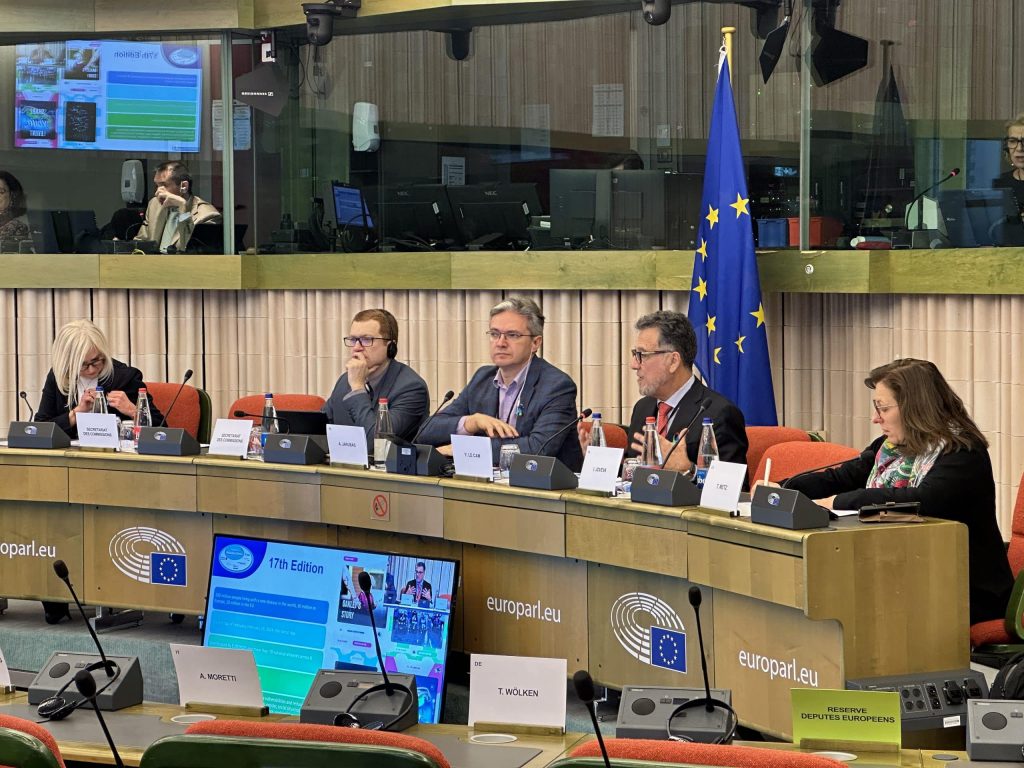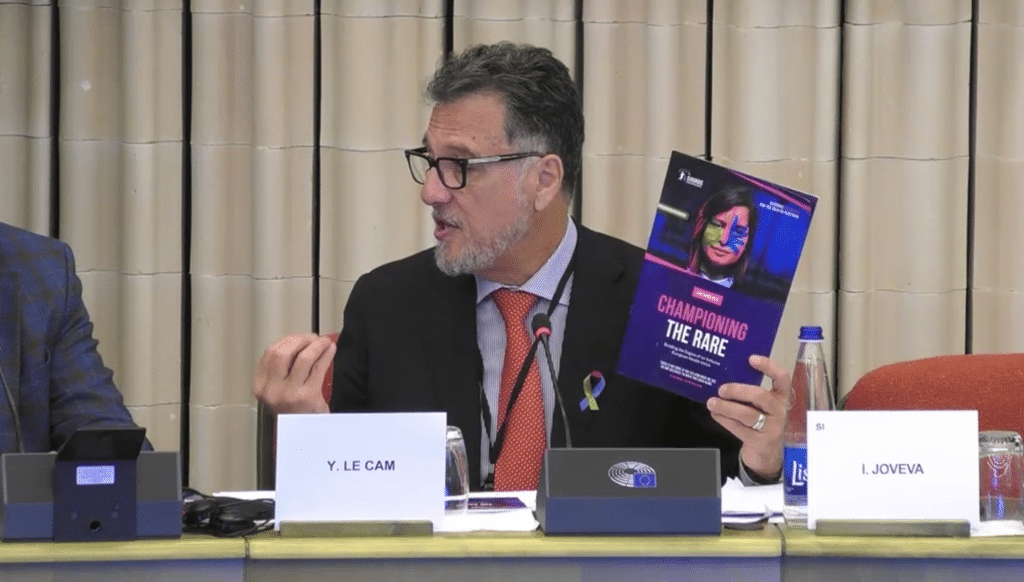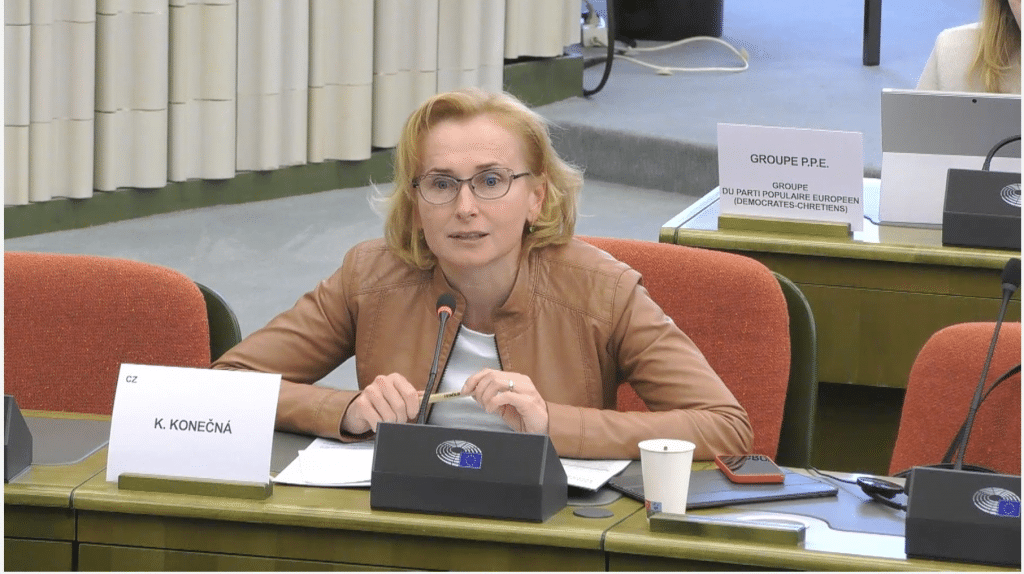Rare Diseases Addressed at the European Parliament
February 202429 February 2024, Strasbourg – On the occasion of Rare Disease Day, the European Parliament’s SANT Subcommittee on Public Health hosted a pivotal exchange of views, which underscored the urgent need for EU-wide action on rare diseases.
The event featured discussions with Members of the European Parliament and the European Commission, alongside Yann le Cam, Chief Executive Officer of EURORDIS-Rare Diseases Europe, and Danielle Drachmann, Executive Director of Ketotic Hypoglycemia International, who championed the cause of rare disease patients across Europe.
Opening the exchange of views, Yann Le Cam – drawing on personal narratives and the collective voice of the rare disease community – introduced the Championing the Rare (#ActRare2024) campaign, aiming to keep rare diseases as a European priority during the next five-year term of EU policymakers and highlighting policy recommendations in eight key areas.

He continued to emphasise the value of a European Action Plan for Rare Diseases which would build on years of policy progress in the area and for which there is strong and repeated support from across the EU institutions. Such a plan would bridge current gaps and foster a sustainable ecosystem of care and support. He added, “We need to bring everything together, and this is the value of Europe.”

The discussion proceeded with Members of the European Parliament who also called for a robust European strategy on rare diseases.
MEP Tilly Metz highlighted the urgency, emphasising the plan’s potential to integrate and maximise EU actions, particularly benefiting smaller Member States like hers, Luxembourg:
“Getting a timely diagnosis and accessing treatment is still a struggle. As we approach the end of the European Parliament mandate, there are crucial opportunities ahead of us to improve the lives of patients with rare diseases and their families. My ambition for the future is to have a European strategy on rare diseases and a European action plan to help integrate all EU actions in the evolving European Union.”

MEP Catherine Amalric echoed the call for a robust research framework, emphasising the need for a collaborative approach to enhance diagnosis and treatment modalities across Europe:
“I would like to assure you of the support of the French delegation in Renew for an action plan that is effective against rare diseases. At a European level, having a campaign is very important because it is the correct level at which to exchange information and ensure precise diagnoses and the best treatments, thanks to the reciprocity of resources.”

Amalric continued, emphasising the need for healthcare sustainability and reducing inequalities:
“We want a Europe where medicines will be available, and we must invest in all those sectors where needs are not being met. We absolutely have to promote innovation and address the challenges of the sustainability of our health systems. Innovation is a priority. Therefore, all our policies must enable us to reduce inequalities in health across Europe, in all member states, and facilitate access to quality treatment through operational systems at both European and national levels so that treatments are accessible and affordable.”
MEPs Joanna Kopcińska and Tomislav Sokol echoed this call, drawing attention to the societal and emotional dimensions of rare diseases and advocating for policies that ensure social inclusion and equal access to healthcare services.
“One of the stories from the #30MillionReasons campaign states: ‘A disease stops being rare when it affects someone close to you.’ It’s true; this perspective changes the way you perceive any type of disease. You see the needs of patients and caregivers on a daily basis, along with many challenges,” said Kopcińska

“Rare diseases are an important cause, one that has not been addressed sufficiently. Patients with rare diseases still do not have a treatment, and one of the issues is access to treatments, in terms of quality of care, standards, expertise, etc. This means that unfortunately, we still have second-class EU citizens. This is something we need to change,” said Sokol.

Following MEP Sokol’s call for change, MEP Kateřina Konečná raised a critical issue regarding the disparity in newborn screening across the EU, highlighting a fundamental inequality that impacts the youngest and most vulnerable:
“It is a shame for Europe, and a shame for member states that newborn screening is far from being commonplace and standard. We should make member states ensure that newborn screening is conducted, make sure that there are sufficient finances for these programmes to be rolled out and the commission should press for it. How is it possible that in one country of the EU, when you give birth, your child has a better chance of survival only thanks to early diagnosis and early care, and in another country in the same union, this is not possible?”

The incoming EU legislature and next European Commission must prioritise revising the Cross-Border Healthcare Directive to ensure rare disease patients access specialised care EU-wide, particularly when their home countries lack such facilities. This move is essential for an equitable healthcare system.
Additionally, reducing the caregiving responsibilities on families, enhancing mental health support, and ensuring the social rights of people living with a rare disease are all key to enabling unhindered and equal participation in society. These steps will affirm the EU’s commitment to healthcare equity and human rights.
As the European Union prepares to welcome the new European Commission and MEPs for the 2024-2029 term, EURORDIS and Europe’s broader rare disease community remain eager to collaborate with policymakers. Such collaboration is key to achieve significant progress in enhancing the lives of those living with rare diseases, addressing their substantial unmet needs through effective and concrete policy actions.
Danielle Drachmann’s address, imbued with personal experience and advocacy, acknowledged the significance of these discussions but emphasised the patients’ anticipation for concrete actions beyond dialogue:
“None of this will mean a thing if we cannot translate today’s presentation into actionable legislation and policy. It takes collective efforts, and I hope that you are ready to take back responsibility. I hope policymakers choose to take action so we can stop burying our children, tearing our community apart, and suffering in silence.”
Download PDF
About EURORDIS-Rare Diseases Europe
EURORDIS-Rare Diseases Europe is a unique, non-profit alliance of over 1,000 rare disease organisations from 74 countries that work together to improve the lives of the 30 million people living with a rare disease in Europe. By connecting people, families and rare disease groups, as well as by bringing together all stakeholders and mobilising the rare disease community, EURORDIS strengthens the patient voice and shapes research, policies and services.
Contact
Julien Poulain
Communications Manager
EURORDIS-Rare Diseases Europe
Julien.poulain@eurordis.org
+33 6 42 98 14 32
